A symposium to raise awareness of the importance of early detection of breast cancer in the Faculty of Arts in cooperation with Lions Clubs
The Faculty of Arts at Ain Shams University organized a symposium to raise awareness of the importance of early detection of breast cancer, in cooperation with the "Lions" clubs, and under the auspices of Prof. Dr. Mahmoud El-Meteini, President of the University, Prof. Dr. Ghada Farouk, Vice President for Community Service and Environmental Development, Prof. Dr. Hanan Kamel, Acting Dean of the Faculty of Arts, and supervised by Prof. Dr. Rasha El-Dedy, Vice Dean for Community Service and Environmental Development, coordinated by Ms. Hala Al-Qadi, President of the Lions Club (Elite), with the participation of the Lions Club in North Cairo, which is headed by Mr. Nabil Al-Attar, and Dr. Reem Ezzat, President of the Lions Club Golden Virus.
In her opening speech, Dr. Rasha Al-Didi said that this symposium comes within the framework of the free awareness and service activities carried out by the sector as a means of effective community participation to raise awareness among the university community to provide practical solutions to reduce the incidence of breast cancer and raise the degrees of recovery through the services provided by the university, its centers, and medical units and what can be achieved in cooperation with civil society institutions.
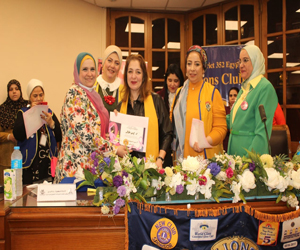 |
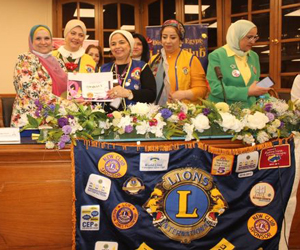 |
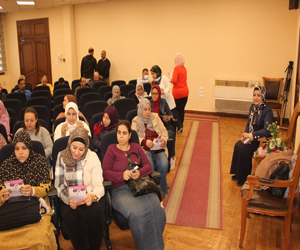 |
||
For her part, Prof. Dr. Nevine Mahmoud Ahmed Jado, Professor of Oncology at Ain Shams Medicine and Director of the Early Diagnosis Clinic for Breast Cancer in the Department of Oncology at the Faculty of Medicine emphasized the role of university hospitals in providing medical support, and that early detection of breast tumors in its first stage leads to a cure rate that may reach 90%, she pointed out that there is significant and remarkable progress in the medical sector thanks to the presidential health initiatives, the remarkable development in university hospitals and the modern technologies used in early detection,
She also indicated the importance of early detection through 3 means: self-examination, which begins at the age of 20 years, radiographic examination, which begins at the age of 40 years, and clinical or medical examination by the direct physician of the case.
She also reviewed the conditions and appropriate timing for the examination, and in the case of a positive examination, the tumor is dealt with by taking a sample from it and completing the examinations, and surgery is not the first step in all cases.
Jado mentioned the most important fixed and variable factors that increase the risk of infection.
She also referred to the efforts of the Cancer Diagnosis and Early Detection Clinic in the Oncology Department of the Faculty of Medicine, which was established in 2015 and staffed by faculty staff in the department on Mondays/Tuesdays/Wednesdays every week.
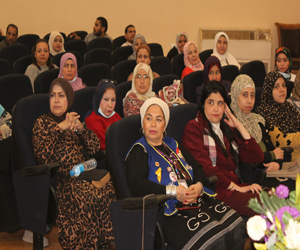 |
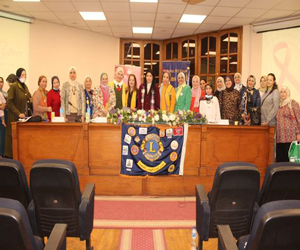 |
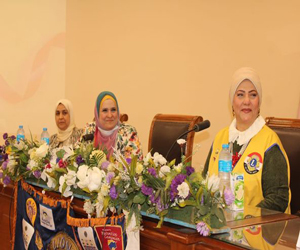 |
||
While Dr. Nabawia Abdel Samad, training consultant, discusses the causes of injury and ways to avoid it. She added that the World Health Organization launched the “I Will Do” initiative three years to urge personal responsibility to raise awareness of cancer. Abdel Samad indicated that a third of injuries are due to eating unhealthy foods.
And she mentioned the most important solutions that a person takes when he knows that he has this disease, which is: (obtaining the advice of experts and doctors - talking with surviving patients - increasing knowledge of the disease every period - spending time doing something that the patient likes - paying attention to eating healthy food that is appropriate to the condition and age - getting closer to God and being satisfied with fate and destiny - trusting that recovery will happen - choosing companionship that helps to overcome the crisis.
The members of the platform also answered the attendees' questions about the topic of the symposium and some common questions in this context, such as some foods and cosmetics whose use leads to an increase in the chances of infection.
At the end of the symposium, Ms. Hala Al-Qadi thanked the Faculty of Arts for its educational, developmental, and charitable work, stressing that there are more joint community activities in the next stage. She also thanked the organizers of the symposium, then the participants were honored.
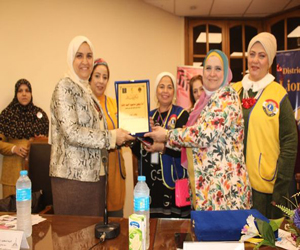 |
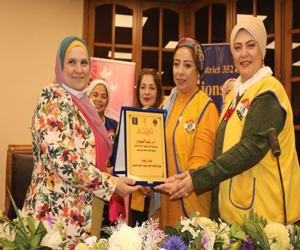 |
|
.svg)




